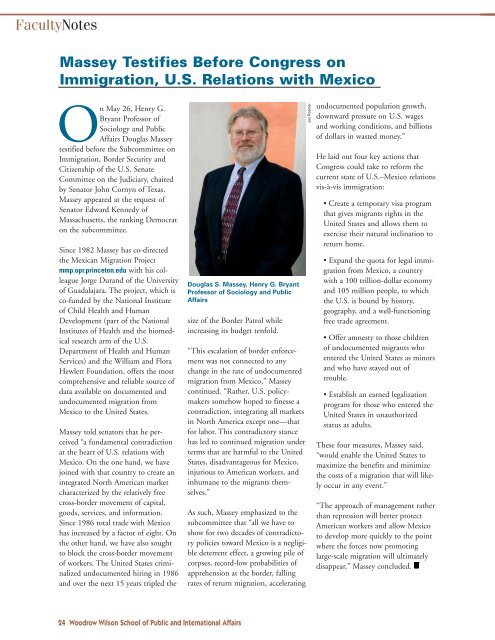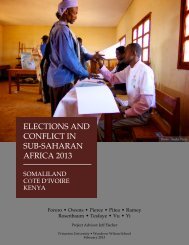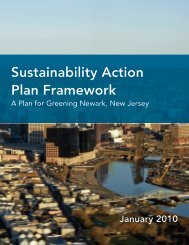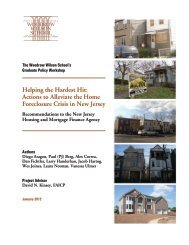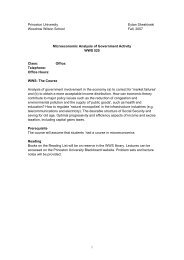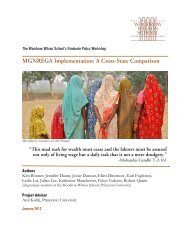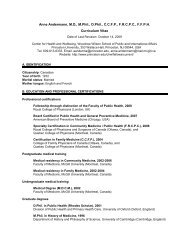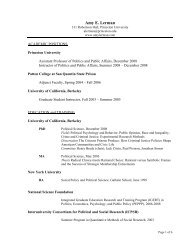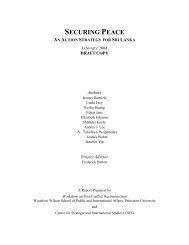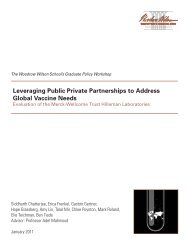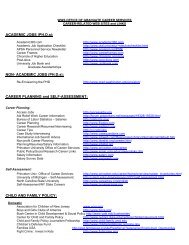Ambassador Ruth Davis: Foreign Service Should Look Like America ...
Ambassador Ruth Davis: Foreign Service Should Look Like America ...
Ambassador Ruth Davis: Foreign Service Should Look Like America ...
Create successful ePaper yourself
Turn your PDF publications into a flip-book with our unique Google optimized e-Paper software.
FacultyNotes<br />
Massey Testifies Before Congress on<br />
Immigration, U.S. Relations with Mexico<br />
On May 26, Henry G.<br />
Bryant Professor of<br />
Sociology and Public<br />
Affairs Douglas Massey<br />
testified before the Subcommittee on<br />
Immigration, Border Security and<br />
Citizenship of the U.S. Senate<br />
Committee on the Judiciary, chaired<br />
by Senator John Cornyn of Texas.<br />
Massey appeared at the request of<br />
Senator Edward Kennedy of<br />
Massachusetts, the ranking Democrat<br />
on the subcommittee.<br />
Since 1982 Massey has co-directed<br />
the Mexican Migration Project<br />
mmp.opr.princeton.edu with his colleague<br />
Jorge Durand of the University<br />
of Guadalajara. The project, which is<br />
co-funded by the National Institute<br />
of Child Health and Human<br />
Development (part of the National<br />
Institutes of Health and the biomedical<br />
research arm of the U.S.<br />
Department of Health and Human<br />
<strong>Service</strong>s) and the William and Flora<br />
Hewlett Foundation, offers the most<br />
comprehensive and reliable source of<br />
data available on documented and<br />
undocumented migration from<br />
Mexico to the United States.<br />
Massey told senators that he perceived<br />
“a fundamental contradiction<br />
at the heart of U.S. relations with<br />
Mexico. On the one hand, we have<br />
joined with that country to create an<br />
integrated North <strong>America</strong>n market<br />
characterized by the relatively free<br />
cross-border movement of capital,<br />
goods, services, and information.<br />
Since 1986 total trade with Mexico<br />
has increased by a factor of eight. On<br />
the other hand, we have also sought<br />
to block the cross-border movement<br />
of workers. The United States criminalized<br />
undocumented hiring in 1986<br />
and over the next 15 years tripled the<br />
size of the Border Patrol while<br />
increasing its budget tenfold.<br />
24 Woodrow Wilson School of Public and International Affairs<br />
Douglas S. Massey, Henry G. Bryant<br />
Professor of Sociology and Public<br />
Affairs<br />
“This escalation of border enforcement<br />
was not connected to any<br />
change in the rate of undocumented<br />
migration from Mexico,” Massey<br />
continued. “Rather, U.S. policymakers<br />
somehow hoped to finesse a<br />
contradiction, integrating all markets<br />
in North <strong>America</strong> except one—that<br />
for labor. This contradictory stance<br />
has led to continued migration under<br />
terms that are harmful to the United<br />
States, disadvantageous for Mexico,<br />
injurious to <strong>America</strong>n workers, and<br />
inhumane to the migrants themselves.”<br />
As such, Massey emphasized to the<br />
subcommittee that “all we have to<br />
show for two decades of contradictory<br />
policies toward Mexico is a negligible<br />
deterrent effect, a growing pile of<br />
corpses, record-low probabilities of<br />
apprehension at the border, falling<br />
rates of return migration, accelerating<br />
Jon Roemer<br />
undocumented population growth,<br />
downward pressure on U.S. wages<br />
and working conditions, and billions<br />
of dollars in wasted money.”<br />
He laid out four key actions that<br />
Congress could take to reform the<br />
current state of U.S.–Mexico relations<br />
vis-à-vis immigration:<br />
• Create a temporary visa program<br />
that gives migrants rights in the<br />
United States and allows them to<br />
exercise their natural inclination to<br />
return home.<br />
• Expand the quota for legal immigration<br />
from Mexico, a country<br />
with a 100 trillion-dollar economy<br />
and 105 million people, to which<br />
the U.S. is bound by history,<br />
geography, and a well-functioning<br />
free trade agreement.<br />
• Offer amnesty to those children<br />
of undocumented migrants who<br />
entered the United States as minors<br />
and who have stayed out of<br />
trouble.<br />
• Establish an earned legalization<br />
program for those who entered the<br />
United States in unauthorized<br />
status as adults.<br />
These four measures, Massey said,<br />
“would enable the United States to<br />
maximize the benefits and minimize<br />
the costs of a migration that will likely<br />
occur in any event.”<br />
“The approach of management rather<br />
than repression will better protect<br />
<strong>America</strong>n workers and allow Mexico<br />
to develop more quickly to the point<br />
where the forces now promoting<br />
large-scale migration will ultimately<br />
disappear,” Massey concluded.


